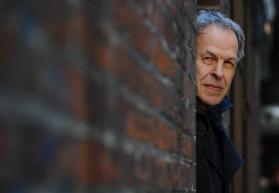What do authors think about editors? What do authors think makes the difference between a good editor and a great editor?
 Previously, BoldFace asked internationally bestselling author Mary Lawson about her experience working with editors. This time we posed the same questions to Linden MacIntyre, a renowned journalist whose work has earned him multiple awards and a long-time co-host of CBC television’s the fifth estate. He is also the author of Why Men Lie and The Bishop’s Man, among others.
Previously, BoldFace asked internationally bestselling author Mary Lawson about her experience working with editors. This time we posed the same questions to Linden MacIntyre, a renowned journalist whose work has earned him multiple awards and a long-time co-host of CBC television’s the fifth estate. He is also the author of Why Men Lie and The Bishop’s Man, among others.
Q&A conducted by Jennifer D. Foster
Overall, what’s your experience like as an author who’s been edited?
I’ve had a variety of experiences. In my first, I never met or spoke to the editor at all about the manuscript. We spoke of many other things: life, music, the struggles of creativity. Eventually he requested, as I recall, no changes in my manuscript, and I believe he farmed it out to a freelancer for what I now understand to have been a line edit. I was then given the marked-up manuscript and advised to accept the changes proposed, none of which were substantial. My next experience involved long meetings (over tea) with an editor who explained just about every change, no matter how minor (such as why “St. Catharines” is spelled with an “a”). My last few experiences were with my editor-publisher, Anne Collins, who is constructively brutal, in painstaking detail. Many of her suggested cuts are, at first glance, fatal, but, on second glance, crucial to the flow and clarity of the story. So I unquestioningly believe everything she says. (Most of the time.)
What is it like as an author to work, say, months, or even years, on a book, then have an editor read it critically and suggest (sometimes major) changes?
I’m probably not typical. I was and am intensely involved with rough-and-ready—and usually impatient—journalistic editors.I’ve worked in long-form television storytelling for decades and gone through hundreds of very tough screening-vetting experiences, which has given me a thicker skin than most book authors. I come to the table confident that the process is about improving the product and that the perspective of the editor is superior to that of the author in terms of detached objectivity and technical competence regarding style and presentation. I take everything seriously, bite my tongue at what I find moderately insulting, consider every suggestion, and only reject advice when it leaves me uncomfortable after about 24 hours’ reflection.
What do you think is the formula for a positive author/editor relationship?
I only know what works. Initially, assuming that the editor has accepted the manuscript and has become a co-adventurer, they should convey 100 per cent confidence in the form and content of the story. Maybe initially address one outstanding deficiency, usually a structural failure about which the author is probably aware. In my case, the first few conversations are generally positive, bordering on fawning. Reality bursts onto the scene with the first marked-up manuscript, complete with sarcastic marginalia, dubious excisions, and an assault on literary “style,” aka pretension. On one occasion I was simultaneously writing a novel and reading Ulysses. Bad idea.
What’s your advice for a writer working with an editor for the first time?
Have lunch, a drink. Talk about the world, life, philosophy. The story. It’s like dating. Slow revelation/discovery serves the long-term outcome best. In the best cases, the author/editor relationship is one of the most intimate any writer will ever experience.
What are the characteristics of a good editor? And a great one?
They all have a particular set of skills: there is craftsmanship in the treatment of a manuscript. A great editor will also combine to a high degree the special gifts of sensitivity, tact, and a genuine affection for the project. A great editor is, in a way, like a great kindergarten teacher—patient, attentive to small details, always conscious that they have responsibility for a work in progress, and that their task is to improve something that in the mind and heart of a proud parent is already perfect.
Jennifer D. Foster is a Toronto-based freelance editor and writer, specializing in books, magazines, and marketing and communications.
This article was copy edited by Abby Egerter.
